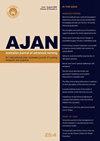Impact of the COVID-19 pandemic on the Australian residential aged care facility (RACF) workforce
IF 1.3
4区 医学
Q3 NURSING
引用次数: 9
Abstract
Objective: We conducted a survey to understand the challenges faced by the staff of residential aged care facilities (RACF), during the COVID-19 pandemic. Background: In the current pandemic, the RACF workforce has been required to work under stressful conditions, with immense mental and physical pressures, resulting in anxiety and stress felt towards their jobs. Study design and methods: We electronically surveyed both clinical and non-clinical staff at public and private RACFs in Australia in June and August 2020. The survey asked a mix of open-ended and closed questions about preparedness for the pandemic, information flow, experience with personal protective equipment (PPE), management of suspected COVID cases, restrictions on visitors, and impact on RACF staff personal and home life. Quantitative data were analysed in SPSS; qualitative data using content analysis. Results: We received 371 responses: 198 from clinical staff and 168 from non-clinical staff. Respondents were between 20–71 years old, and 87% were female most commonly from Victoria (28%) or New South Wales (28%). The majority (80%) felt that Australian RACFs were well-prepared for the pandemic and 87% agreed that relevant healthcare authorities were contactable for information needed. A total of 37% reported challenges in estimating and ordering appropriate quantities of protective equipment. Ninety percent of facilities reported screening residents for possible symptoms and 77% introduced precautions or quarantine measures to protect residents. Most participants (98%) reported their RACF implemented restrictions on visitor access and 43% reported unfair or abusive treatment by family or friends of the residents. Commonly reported personal impacts included: workload increase, stress, emotional toll, family issues and fatigue. Support from colleagues as well as training, de-brief sessions and frequent meetings were identified as helpful facilitators during this time. Conclusion: We identified a wide range of practices and coping strategies among Australian RACFs. Whilst a majority of respondents reported coping well, a large proportion reported struggling both mentally and physically. Factors reported as helpful by the respondents may assist RACFs in planning for future pandemics. Implications for research, policy and practice: Understanding the challenges faced by all levels of staff within RACFs may aid decision-makers on a range of different levels – researchers, aged care providers, local/regional/state health departments and national leaders within government to help inform the development of interventions that may help the sector to recover, as well as prepare for potential future outbreaks. Of particular importance, are interventions or initiatives that focus on supporting the physical and mental health of staff i.e. those that prevent or minimise worker fatigue, emotional burnout and stress. What is already known about the topic? Nursing staff in Australian RACFs did not feel prepared for the COVID outbreak in their workplace. Early in 2020, RACF nurses experienced a greater overall workload and some had their staff hours reduced by their employers due to financial constraints caused by the outbreak. What this paper adds This paper offers a comprehensive insight into how RACF staff coped both individually and as part of the facility overall during the COVID crisis. It identified that a commonly reported source of stress was first-hand verbal abuse from family or friends of residents in response to visitor and lockdown restrictions implemented by the authorities. The paper highlighted that whilst the majority of respondents felt that RACFs were well prepared for managing residents during the pandemic, some facilities experienced significant problems with workloads, PPE and human resourcing. Furthermore, the survey showed that on an individual level, some staff experienced significant mental and physical stress during the outbreak.COVID-19大流行对澳大利亚住宅老年护理机构(RACF)劳动力的影响
目的:通过调查了解2019冠状病毒病(COVID-19)大流行期间居家养老机构(RACF)工作人员面临的挑战。背景:在当前的大流行中,应急援助部队的工作人员必须在紧张的条件下工作,承受巨大的精神和身体压力,导致他们对工作感到焦虑和压力。研究设计和方法:我们于2020年6月和8月对澳大利亚公立和私立racf的临床和非临床工作人员进行了电子调查。该调查提出了一系列开放式和封闭式问题,涉及大流行的准备工作、信息流、个人防护装备(PPE)的使用经验、疑似COVID病例的管理、对访客的限制以及对RACF工作人员个人和家庭生活的影响。定量数据用SPSS进行分析;使用内容分析的定性数据。结果:共收到371份回复,其中临床工作人员198份,非临床工作人员168份。受访者年龄在20-71岁之间,87%是女性,最常见的是来自维多利亚州(28%)或新南威尔士州(28%)。大多数人(80%)认为,澳大利亚地区基金为大流行做好了充分准备,87%的人同意,可以联系相关卫生保健当局获取所需信息。总共有37%的人报告在估计和订购适当数量的防护设备方面存在挑战。90%的设施报告了对居民可能出现的症状进行筛查,77%的设施采取了预防措施或隔离措施,以保护居民。大多数参与者(98%)报告说,他们的RACF对访客的访问实施了限制,43%的人报告说,他们受到了居民的家人或朋友的不公平或虐待。通常报告的个人影响包括:工作量增加、压力、情绪低落、家庭问题和疲劳。在此期间,同事的支持、培训、简报会议和频繁的会议被认为是有益的促进因素。结论:我们确定了澳大利亚农村养老基金的广泛实践和应对策略。虽然大多数受访者表示应对得很好,但很大一部分人表示在精神和身体上都有挣扎。答复者报告的有益因素可能有助于区域协调基金规划未来的大流行病。对研究、政策和实践的影响:了解区域合作基金内各级工作人员面临的挑战,可能有助于研究人员、老年护理提供者、地方/区域/州卫生部门和政府内的国家领导人等不同层面的决策者,帮助制定可能有助于该部门恢复的干预措施,并为未来可能爆发的疫情做好准备。特别重要的是侧重于支持工作人员身心健康的干预措施或举措,即预防或尽量减少工人疲劳、情绪倦怠和压力。关于这个话题我们已经知道了什么?澳大利亚racf的护理人员没有为工作场所的COVID疫情做好准备。2020年初,RACF护士的总体工作量更大,由于疫情造成的财务限制,一些护士的工作时间被雇主减少。本文阐述了在COVID危机期间,RACF工作人员如何单独应对和作为整体设施的一部分应对。它确定,通常报告的压力来源是居民的家人或朋友对当局实施的访客和封锁限制的直接口头虐待。该文件强调指出,虽然大多数答复者认为,在大流行期间,区域中心为管理居民做好了充分准备,但一些设施在工作量、个人防护装备和人力资源方面遇到了严重问题。此外,调查显示,就个人而言,一些工作人员在疫情爆发期间经历了严重的精神和身体压力。
本文章由计算机程序翻译,如有差异,请以英文原文为准。
求助全文
约1分钟内获得全文
求助全文
来源期刊
CiteScore
2.30
自引率
7.10%
发文量
27
审稿时长
>12 weeks
期刊介绍:
The Australian Journal of Advanced Nursing publishes a wide variety of original research, review articles, practice guidelines, and commentary relevant to nursing and midwifery practice, health- maternity- and aged- care delivery, public health, healthcare policy and funding, nursing and midwifery education, regulation, management, economics, ethics, and research methodology. Further, the journal publishes personal narratives that convey the art and spirit of nursing and midwifery.
As the official peer-reviewed journal of the ANMF, AJAN is dedicated to publishing and showcasing scholarly material of principal relevance to national nursing and midwifery professional, clinical, research, education, management, and policy audiences. Beyond AJAN’s primarily national focus, manuscripts with regional and international scope are also welcome where their contribution to knowledge and debate on key issues for nursing, midwifery, and healthcare more broadly are significant.

 求助内容:
求助内容: 应助结果提醒方式:
应助结果提醒方式:


